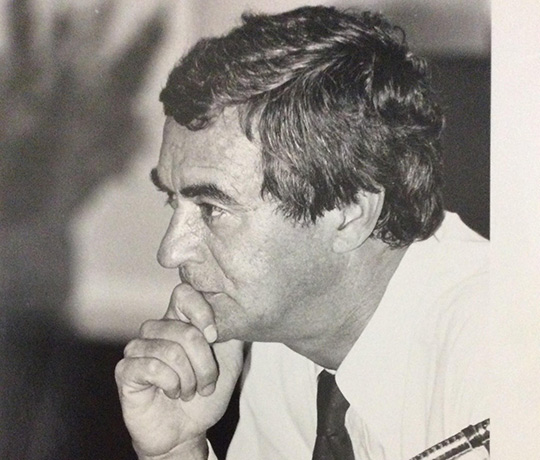Roger A. Myers: A Remembrance
I arrived late to the party. Roger was just a few years from retirement when I arrived at TC as a student in 1988. There are so many who know him far better than I. I tend to remember him the way a student does, somewhat larger than life, as though looking upward at a giant.
My only classroom contact with Roger was in his flagship course: Vocational Appraisal. Wanting to be therapists, many students (including me) were surprised that a course in career counseling was being required of them. I sat there as week after week as Roger overcame a hostile audience with droll or sardonic asides and a store of knowledge that was not only comprehensive, but synthesized. I left class each week knowing what the “take home” was. He was smart and funny. The class grew on me more that I thought it would
As a beginning doctoral student I was amazed that he always seemed to have time. Every time I approached him in the hall and asked if I could speak with him, he would reach into his pocket and pull out his calendar, fix me in his gaze, and say “when would be good for you?” Whatever time I picked, it was always okay.
I remember sitting in his office, looking up at the shelves stacked with copies dissertations he had served on. The stacks seemed to go from the floor to the ceiling. There were even ladders there to reach the top selves. It was in that office that he told me that my first idea for a dissertation was no good—more anthropology than psychology. He saved me a lot of grief, and directed me to a new faculty member who was studying the topic from a psychological point of view.
Roger had retired before I joined the faculty, and it was only later that I began to realize what an extraordinary presence he had been nationally in our field: President of the APA’s Division of Counseling Psychology, head of the accrediting body, a founding member of the group of Directors of Training in Counseling Psychology. Working along side TC professors Donald Super, Albert Thompson, and Jean Pierre Jordaan, Roger was influential in the establishment of counseling psychology as a profession and in the development of psychology at Teachers College. There didn’t seem to be a leadership post he hadn’t held or a part of the field to which he hadn’t contributed. I couldn’t imagine this as a student; he wore it all pretty lightly.
Even in retirement he remained close to the field and to the program. While his hip held out, he continued to attend APA’s annual convention. I looked forward to our yearly meeting. Once when I was Director of Training, I asked for some advice and I apologized for bothering him in retirement. He replied, “that program is my life’s work,” meaning, of course I was not bothering him.
Finally, Roger was a TC guy. I sometimes find it difficult to see beyond the trials and travails of my own program. Roger was a counseling psychologist par excellence, but was also someone who saw himself as belonging to the College, working for the greater good at TC and doing whatever was needed.
Now I teach the course he taught me – updated and reimagined for a new age, but he would find it quite recognizable. I look out at students who dare me to teach them this unanticipated subject matter and try to make sure there is a take home message that they will remember. I don’t dare to end a sentence with a preposition, and always refer that section of manuscripts as “Method” not “Methods.” I sit in the office that was his; the ladders are still there. I cannot help but think of Roger often as I look out those windows. Not a day goes by that I am not aware that I stand on the shoulders of giants. Teachers College, Counseling Psychology, and I have much to be grateful for. – George Gushue
Published Wednesday, Sep. 16, 2015
